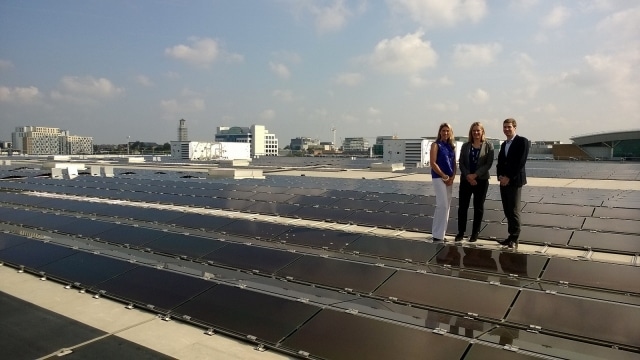Solar subsidies might be next on the DECC chopping block. Amber Rudd, secretary of state for the Department of Energy and Climate Change (DECC), has warned that the government is “looking carefully” at the payments.
Speaking to Solar Power Portal at the official opening of the second phase of Ketton Solar Farm’s 13MW project, Rudd said: “There has been a lot of subsidy in this area – a lot.
“More than people anticipated when the feed-in tariffs and the renewable obligation were set up and we have to find ways of supporting solar that doesn’t involve subsidy.”
This comes just a month after DECC announced it will scrap subsidies for new onshore wind projects from 1 April 2016. But it also follows Rudd’s post-election statement that she hopes to “unleash a solar revolution” across Britain to encourage homeowners to install panels on their roofs.
Spending Cap
Rudd, on Monday, explained that subsidies might be cut for solar due to DECC overspending on the Levy Control Framework (LCF) – this aims to provide certainty to investors while limiting financial impact on those who will ultimately foot the bill for new renewable and low-carbon electricity schemes.
Fears that the LCF spending cap for green power subsidies will be breached have been circulating for a while, but this week they ramped up further as the Office for Budget Responsibility released its official forecast.
In 2012, the coalition set a cap of £7.6bn for 2020/21. Forecasts now predict that spending will reach £9.1bn by this time, some 20 percent over the original LCF cap.
“We have to look very carefully at the cost going forward, and I think the industry is expecting that,” Rudd told Solar Power Portal.
She continued: “I’d like to see solar at grid parity. I’d like to see lots of solar without subsidy – that’s the ideal outcome.”
But as Sands argued: “All the money that has already been invested in the renewable energy industry will be completely wasted if funding is cut.
“Combined with the cuts to wind subsidies, it looks like the government is gearing up for a full frontal attack on the renewable energy sector. Jobs will go and emissions will rise at a time when policies and funding should be in place to ensure quite the opposite.”
Speaking at the project’s opening on Monday, Selwyn said: “The recent changes in government support means that many large scale solar projects of this type are now not viable. The solar industry is making rapid progress in reducing costs, and will become the first energy source to be subsidy free by 2020.
“However, we would urge the government to provide stability and certainty for the industry as we make the journey to zero subsidy. This will enable us to continue to provide significant new clean energy capacity and maintain the many thousands of jobs in the sector.”
Photo: Amber Rudd visiting Ikea solar array via DECC / Flickr
Subscribe to our newsletter
Stay up to date with DeSmog news and alerts






